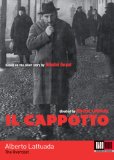| Reviews & Columns |
|
Reviews DVD TV on DVD Blu-ray 4K UHD International DVDs In Theaters Reviews by Studio Video Games Features Collector Series DVDs Easter Egg Database Interviews DVD Talk Radio Feature Articles Columns Anime Talk DVD Savant Horror DVDs The M.O.D. Squad Art House HD Talk Silent DVD
|
DVD Talk Forum |
|
|
| Resources |
|
DVD Price Search Customer Service #'s RCE Info Links |
|
Columns
|
|
|
Overcoat (Il Cappotto), The
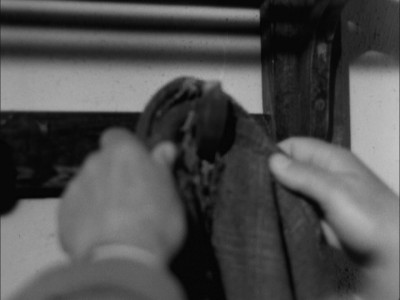
Italian filmmaker Alberto Lattuada has until recently been thoroughly overshadowed by countrymen like Fellini, Visconti, and Pasolini, all of whom, like Lattuada himself, cut their teeth in the post-WWII Italian Neorealist movement. Unlike Lattuada, however, those directors went on to fully develop idiosyncratic, personal cinematic visions and become internationally discussed and widely admired; Lattuada remained relatively unknown outside his homeland, and not until Criterion released his 1962 dark comedy Mafioso a few years back did he even have a single title available to American DVD renters and collectors (bar the 1950 film Variety Lights, in which case the name of his co-director, Federico Fellini, was the much heavier, more familiar draw). Now, after that first inroad, RaroVideo--a label that specializes in bringing worthwhile but under-canonized Italian gems into American homes--is making further strides on the Lattuada front by releasing his 1952 film The Overcoat (Il Cappotto)*, a gem of a broad comedy-cum-satire-cum-tragedy that uses great Russian writer Nikolai Gogal's famous 1842 short story as its unlikely springboard.
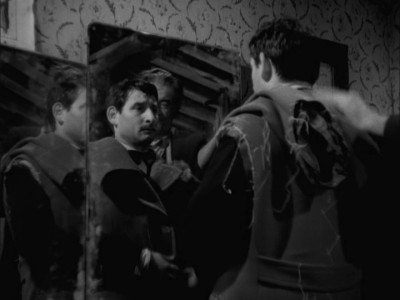
The film's satirical tone is drolly and succinctly defined from the outset, when post-credit titles inform us that "This film is based on a story by Nikolai Gogol, and there is no connection with facts or people of our time." That's an intentional, winking case of protesting too much if there ever was one; it only highlights the fact that the film is set in the Italian present of 1952, and if it does, indeed, share characters, certain generic settings, and plot points with Gogol's rather more deadpan and allegorical tale, the point here is unmistakably to apply the 19th-century Russian's critique of the corrupt social hierarchy and bureaucracy of his time and place to those that exist in the film's provincial Italian town, where they stifle, oppress, and eventually ruin one Mr. de Carmine (Renato Rascel). De Carmine is a hapless, guileless everyman who works as a clerk in a city hall ruled by a scheming, wheeling-and-dealing, bribe-taking mayor and his underlings, whose crass and hollow ambitions preclude their giving due attention to their impoverished constituents--a negligence that eventually has the most dire consequences for Mr. de Carmine himself.
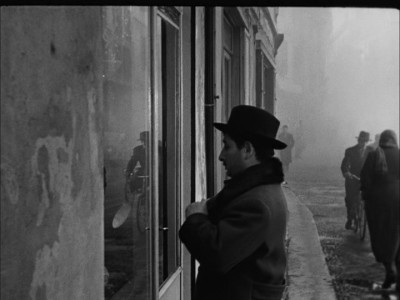
The little clerk is a prosaic character with a mundane problem: a careless coworker has mishandled his overcoat, tearing a prominent hole right at the nape of the neck. De Carmine, embarrassed, looks for a way to mend the hole, but his flailing (and very funny) efforts only seem to make it worse, and it soon becomes clear that he will have to replace it. If his cramped flat in a building where he's surrounded by desperate neighbors (who overestimate his influence and pressure him to be their emissary to an indifferent city government) was not sufficiently indicative of de Carmine's meager position and puny salary, then the fact that obtaining a new overcoat represents a prohibitive, budget-busting expense for him drives the point home. He is finally, after fortune smiles on him a bit, able to finance the acquisition of a smart, tailor-made new coat, which reveals the classist superficiality of the world around him when he is immediately treated with unaccustomed deference and respect by everyone, all because luck has enabled him to dress a little more sharply than usual. The clerk is even invited to the party of a superior, where he is able to actually interact and flirt a little with the mayor's mistress (the sensuously captivating Yvonne Sanson, star of Raffaello Matarazzo's runaway melodramas), amply enjoying himself and his new status even as he casts guilty glances through the windows of the well-appointed apartment at a group of destitute persons that has begged him to make their case to the upper crust and are now left literally out in the cold.
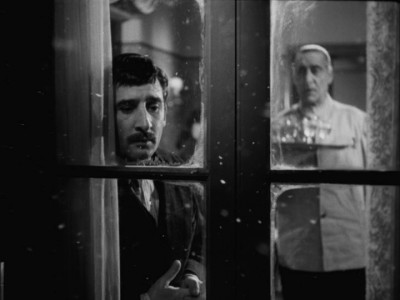
An overcoat is, however, a shaky foundation for one's social status, as de Carmine discovers after his fortunes reverse once more, his prized coat is stolen, and he finds himself and his plight faced with the same deaf ears on the part of the powers that be with which his friends and neighbors have contended for so long. Driven deliriously mad by his sudden loss and its implications, de Carmine dies a feverish, madly babbling death in his hovel. But the society that failed the small-time clerk will not be so easily rid of him. Starting with his hearse's disruption of a pompous public welcome for an aristocrat that the mayor and his staff have been putting all their energies into, and extending to his post-interment spectral harassment of all the townspeople fortunate enough to have their overcoats intact and unstolen (up to and specifically including the mayor himself), the spirit of this anonymous working-class yob who seemed so easily dismissible proves to be a remarkably resilient thorn in the side of the complacent and corrupt order that discarded him.
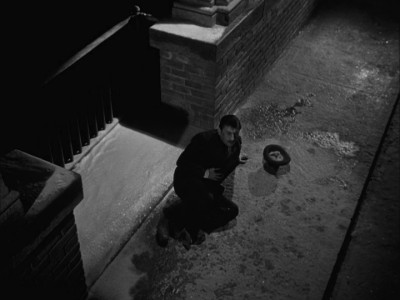
The Overcoat is undeniably Rascel's show. His bottomless resourcefulness when it comes to physical comedy, his character's seemingly mundane but somehow very touching and increasingly complicated predicament, and even his little mustache practically demand comparisons to Chaplin, and Rascel acquits himself nicely, rendering a pleasingly high proportion of his gags and slapstick moments occasions for out-loud laughter. Lattuada's style nicely facilitates Rascel's talents; it is loose, but with a surprising degree of evocative and graceful visual composition. The film thus makes for a nice marker of Italian cinema at its midway point between the rigorous, shot-in-the-street realist peak of Rossellini's Germany Year Zero and the rapturous, entirely studio-bound artificiality of something like Visconti's Le Notti bianche (also based on a famous bit of Russian literature) a few years later. The film is something slighter yet more socially conscious and more fun than Gogol's great story, and if it must in the end be considered a more minor production in the context of the fecund Italian cinema of its time, it's one that's well worth remembering and revisiting, a fine little extension of the journey after one has traveled Italian film's main road with Rossellini, Fellini, Antonioni, and company.
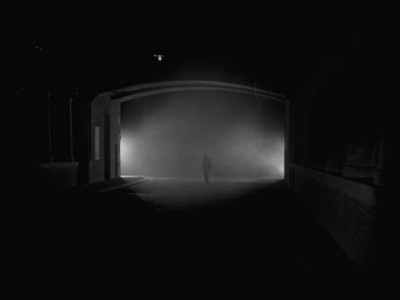
*in addition to his 1970 film Come Have Coffee with us
THE DVD:
Other than some stray scratches and some light flicker or wear-induced grain here and there, RaroVideo's transfer of The Overcoat (at the original 1.33:1 aspect ratio) is remarkably smooth. One oddity noted was some intermittent slight cropping at the top or bottom of the frame, which may reflect the use of mixed sources or could just be an anomaly of the film as originally printed and exhibited; in any case, it is so minor as to detract very little from the experience.
Sound:The Dolby Digital 2.0 mono soundtrack (in Italian with optional English subtitles) is very nice, reflecting the quality of the original audio (post-synched rather than direct-sound, as always for Italian films before the later 1970s), which has as its only real flaw a fairly harsh soft/loud dynamic; there is no distortion per se; it can just be somewhat jarring when a character speaks more loudly or yells.
Extras:--A 13-minute interview with Angelo Pasquini, a contemporary Italian writer/director, that is interesting as far as it goes in a general way on the history of Italian cinema, but which is somewhat disappointingly tenuous in connection to The Overcoat, only fleetingly mentioned by Pasquini.
--A feature-length audio commentary by Italian film/criticism professor Flavio de Bernardinis and his colleague Gabrielle Lucantonio (in Italian with optional English subtitles), in which the two scholars, in what they more or less accurately introduce as an "informal chat," milk every scene for opportunities to provide a very wide context that encompasses The Overcoat's coordinates on the map of Italian cinema, actor and crew biographies, specific production history/anecdotes, and the two experts' exegesis/criticism of The Overcoat itself.
--Twenty-five minutes of deleted scenes are slightly mislabeled; introductory titles inform us that these are silent rushes that were edited down and integrated into the final film, and much of it merely replays (without sound) what we have already seen, with the bonus of some extended physical comedy from Renato Rascel. The main purpose this extra serves is to demonstrate just how closely to the virtues of silent comedy much of The Overcoat hews; it makes sense, given the tone and aesthetic of the completed film, that in most of this material the lack of sound hardly matters at all.
--A 20-page booklet follows the standard, thoughtful, and thorough RaroVideo template by collecting two new appreciations of the film, excerpted interview quotes from Lattuada, and reviews, both contemporaneous and retrospective, of the film itself.
FINAL THOUGHTS:A post-Neorealist comic fable showcasing the hilarious talents of Renato Rascel, Alberto Lattuada's The Overcoat is a welcome addition to the ever-expanding universe of Italian cinema available on DVD. It won't displace the landmark works of Rossellini or Antonioni, but it has a loose, light, genuinely funny charm that grants it a place all its own. Its impact may be shorter-lived than that of a true masterpiece, but it's sheer enjoyment, an indulgent pleasure to see; its brand of well-crafted comic agility is certainly rare enough, and Lattuada and Rascel have created something seriously amusing that will more likely than not leave you helplessly smiling at its ultimate poignancy once all the contagious, fast and furious laughter has died down. Recommended.
|
| Popular Reviews |
| Sponsored Links |
|
|
| Sponsored Links |
|
|
| Release List | Reviews | Shop | Newsletter | Forum | DVD Giveaways | Blu-Ray | Advertise |
|
Copyright 2024 DVDTalk.com All Rights Reserved. Legal Info, Privacy Policy, Terms of Use,
Manage Preferences,
Your Privacy Choices | |||||||









